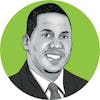 See
more of the story
See
more of the story
As I wandered around a food truck festival with my girls near Union Depot in St. Paul last month, we found Bradley Taylor and his doughnuts. Taylor is a 31-year-old Black man who operates the Donut Trap at farmers markets around the Twin Cities.
The side of his truck proudly said, "Keep It Sexy Eat Donutz," and its front display had an array of treats we wanted to try. There were doughnuts with Fruity Pebbles and others with a tasty pink frosting. They all had funky names, such as "Old Dirty Bastard" and "Gilmore Girls."
After Taylor stepped off the truck, we talked. He had an infectious energy that attracted the long line of people who craved both his food and his positive vibe.
"Hey, man," he said to me. "Did you play football? You look good."
I grinned and told him to keep grinding and doing great work.
We ended our brief interaction with the handshake-to-half-hug routine that's a common greeting among Black folks. As we left the festival, my oldest daughter commented on my conversation with Taylor.
"You know what, Dad?" my 13-year-old said to me. "That was really wholesome."
Her comment reminded me that she — and a whole generation of young people just like her — are watching us. But her perception of my dialogue with Taylor also made me self-conscious. Perhaps she hadn't seen her father as joyful as I had been in the past, I worried, so maybe that moment seemed rare, which is why she noticed.
The pandemic has tried to swallow the entire world. To be Black right now, however, is a unique reality.
I often reflect on James Baldwin's illuminating perspective on the one constant within the Black experience: "To be [Black] in this country and to be relatively conscious is to be in a state of rage almost all of the time."
I want my children to acknowledge that rage without allowing the anger and frustration to become hatred. It's a taxing exercise — the restraint, patience and grace this all demands — but it's the only path to self-care and hope. Amid the clouds, I want them to make room for the moments that offer nothing other than temporary happiness. I want them to know that, if and when they can, they should go for a hike or take a solo trip across the ocean or go bowling with new friends because the world won't change overnight — and it's OK to enjoy their lives in the meantime.
When I left Taylor's truck with a bag full of doughnuts, I was happy. I enjoyed seeing another Black person who'd found something within himself to keep going and discovered ample compassion to bless someone else's day.
"For me, I guess in a way, it's kind of sacrificing," he told me. "One, I want to show all these people, especially suburban people, here is a Black dude who started out with nothing and here we are talking and having fun."
He's from Compton, Calif., but he also spent some time in Redondo Beach. He lived in two different worlds on the West Coast — between his mother's and father's homes — which made him more adaptable, he said.
After enrolling at the University of Minnesota, Bradley would invite friends over to his house and make doughnuts. It quickly became a science to him.
"I was like, 'Why does this doughnut taste a little bit different from this place? Why is the texture like this?' as my taste buds started to mature," he said.
That passion evolved into a business venture: a restaurant first and then a food truck.
Through his doughnuts, he has created a platform for dialogue. He said he notices that people seem at ease when they're chomping on the sweet treats produced by a young Black entrepreneur.
"It always comes down to the doughnuts," he said. "The conversation could be about just different flavors and sometimes it might segue into deeper topics."
I asked Taylor about life as a Black businessman after George Floyd's murder in the middle of a pandemic. He said he sometimes goes to places in Minnesota where ignorance reigns and he has to explain that Minneapolis isn't a bad place. But he focuses on giving back. From a financial perspective, selling doughnuts from a food truck is "kind of scary," Taylor said, but he donates some of the proceeds from the Donut Trap to nonprofit organizations that affect young people. He also mentors and encourages kids to dream.
"I just remember my family always helping out when they could," he said. "Plus, growing up with four brothers and sisters with a single mom, you just share everything."
Taylor and I also connected as Black fathers. We talked about the rage Baldwin highlighted. I told him about my journey to keep those emotions at bay and to live with love, along with our collective desire to display those traits for our children.
"Kids, they do what your actions are," he said. "They watch what your actions are."
That day at the food truck festival in St. Paul, my daughters saw two Black men embrace one another. They also saw my joy.
We had doughnuts. We didn't need anything else.




